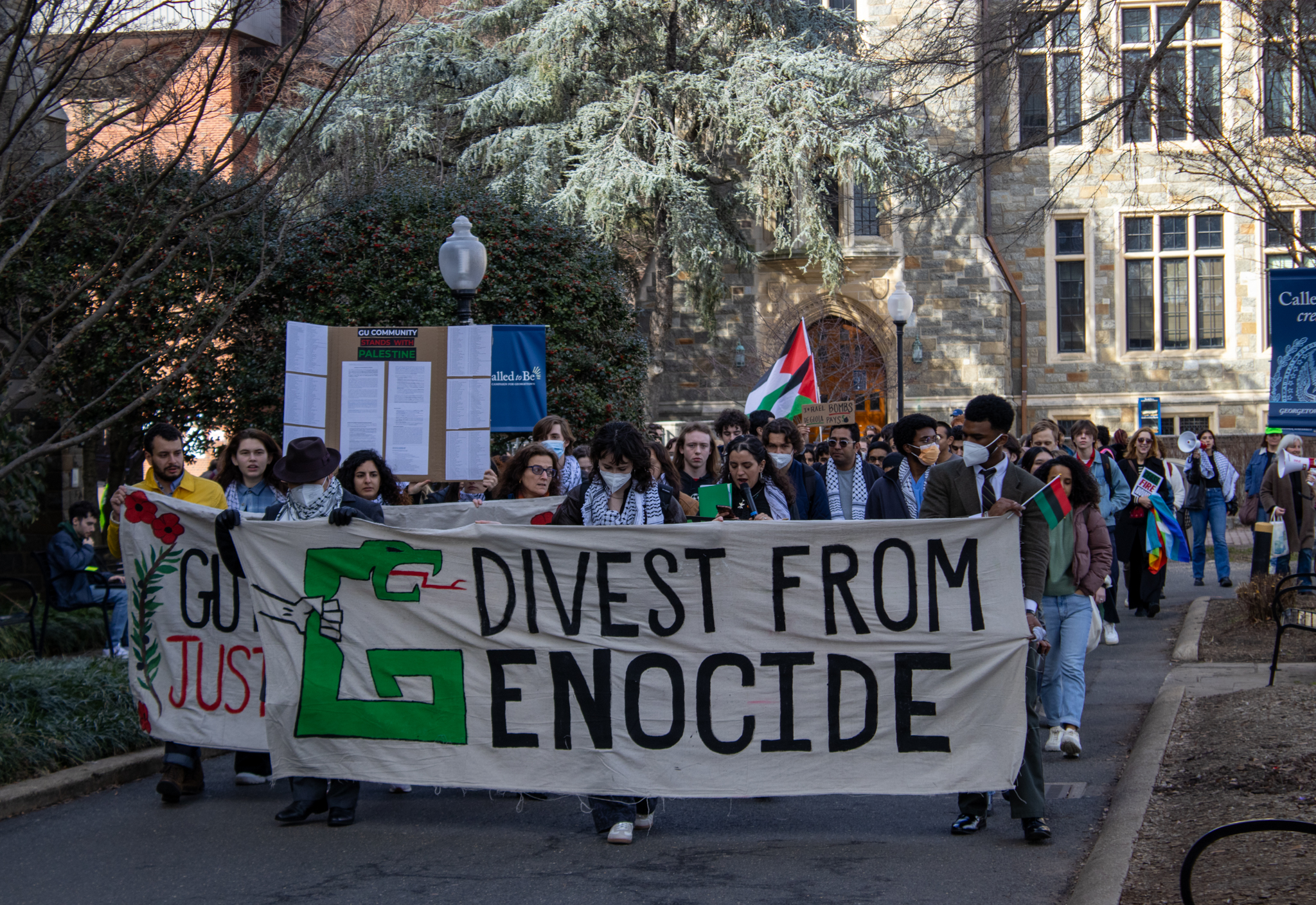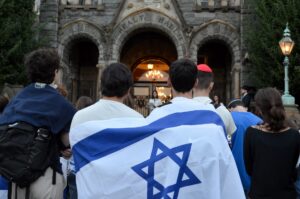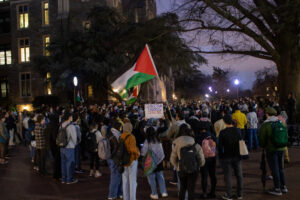Over 100 students, faculty, and staff held a walkout from class and work on Feb. 8 to call on Georgetown to divest its endowment from companies that invest in technologies used by the Israeli military to murder and police Palestinians in Gaza and the West Bank.
The event was co-organized by Students for Justice in Palestine (SJP), Zeytoun, a graduate student group that advocates for decolonization in Southwest Asia and North Africa, Faculty and Staff for Justice in Palestine (FSJP), Jewish Voice for Peace (JVP), GU Medical Students for Palestine, and Georgetown Law Students for Justice Palestine. These groups have joined together in a new divestment coalition, which delivered its demands for divestment to President John DeGioia’s office at the end of the walkout.
Their demands include that Georgetown publicly call for a ceasefire, protect students involved in SJP by affirming the group’s right to free speech and assembly, create a working group on Arab, Muslim, and Palestinian inclusion, suspend its study abroad program in Tel Aviv in favor of a PalTrek program, and divest its endowment from companies that support Israeli occupation.
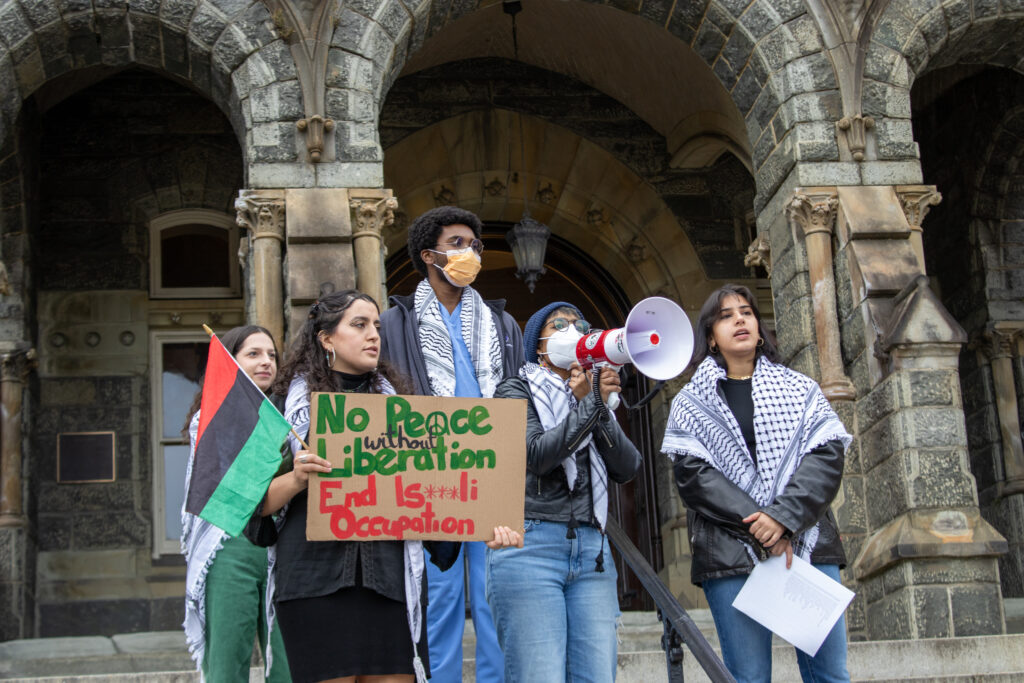 Photo by Connor Martin
Photo by Connor Martin
Currently, over $28.4 million dollars of Georgetown’s endowment is invested in Alphabet (Google) and Amazon—corporations that help develop technology for the Israeli military. Both companies have been contracted by Israel as a part of Project Nimbus, a $1.2 billion cloud-computing system used by the Israeli military to survey and collect data on Palestinians. The involvement of both companies in the Israeli genocide in Gaza has prompted protests, worker strikes, and boycotts.
As of Feb. 9, Israeli attacks have killed more than 27,840 people and injured over 67,317 in Gaza since Oct. 7. According to U.N. data, Israeli forces have also killed more than 360 Palestinians in the West Bank. The Feb. 8 walkout marks 125 days of renewed Israeli attacks, following a 75-year history of apartheid and oppression.
Students began by gathering in Red Square at 2 p.m., where a representative from SJP addressed the crowd.
“I am so proud of every single one of you for being here,” Selina al-Shihabi (SFS ’26) said. “You actively made a choice to turn today for justice. You made a choice to be here, to call on Georgetown to divest from death.”
Organizers highlighted the coalition’s goal: boycott, divestment and sanction (BDS). BDS, a Palestinian-led movement that began in 2005 is inspired by similar actions during South African apartheid. The campaign aims to place non-violent pressure on Israel and companies supporting Israeli occupation. In the wake of Israel’s renewed sieges in Gaza, BDS has gained traction, with major companies including Starbucks and McDonald’s reporting financial losses, as a means of peaceful protest and economic responsibility.
“It’s making a difference here at Georgetown,” al-Shihabi said. “It’s making a difference worldwide, with Starbucks losing over 11 billion dollars.”
Divestment protests have become a common tool for students organizing for a free Palestine throughout the country. Currently, nineteen student protestors at Brown University are on day eight of a hunger strike to pressure their university to divest from companies that support Israeli occupation of Gaza and the West Bank.
Organizers with FSJP affirmed that they are here to support students—both at Georgetown and at other schools—who have faced backlash for their activism. Many universities across the country have responded to pro-Palestine student activism by arresting students or charging them with disciplinary action. SJP chapters at George Washington University, Columbia University, and Brandeis University were suspended. In spite of these efforts, college-aged organizers have continued to call for divestment and a ceasefire.
“In this moment we stand united with our students here at Georgetown and with students across the country who have faced lethal assaults, doxxing, job losses, expulsions, suspension, and even eviction because they refuse to accept genocide,” Akanksha Sinha (SFS ’23), an organizer with FSJP said. “We say to these institutions, ‘If you want to get to students, you have to go through us.’ We say to these students, ‘We have your back.’”
After FSJP’s speeches concluded, organizers led a march to Healy Hall. As demonstrators marched, calls of “Free Palestine,” “No more weapons, no more wars,” and “Ceasefire now” echoed across Copley Lawn. Demonstrators were led by safety marshals and police liaisons, each designated by yellow or pink vests.
Upon arriving at the Healy Steps, representatives from Zeytoun spoke about Georgetown’s participation in the oppression of those in Gaza and the West Bank in spite of the university’s Socially Responsible Investing policy.
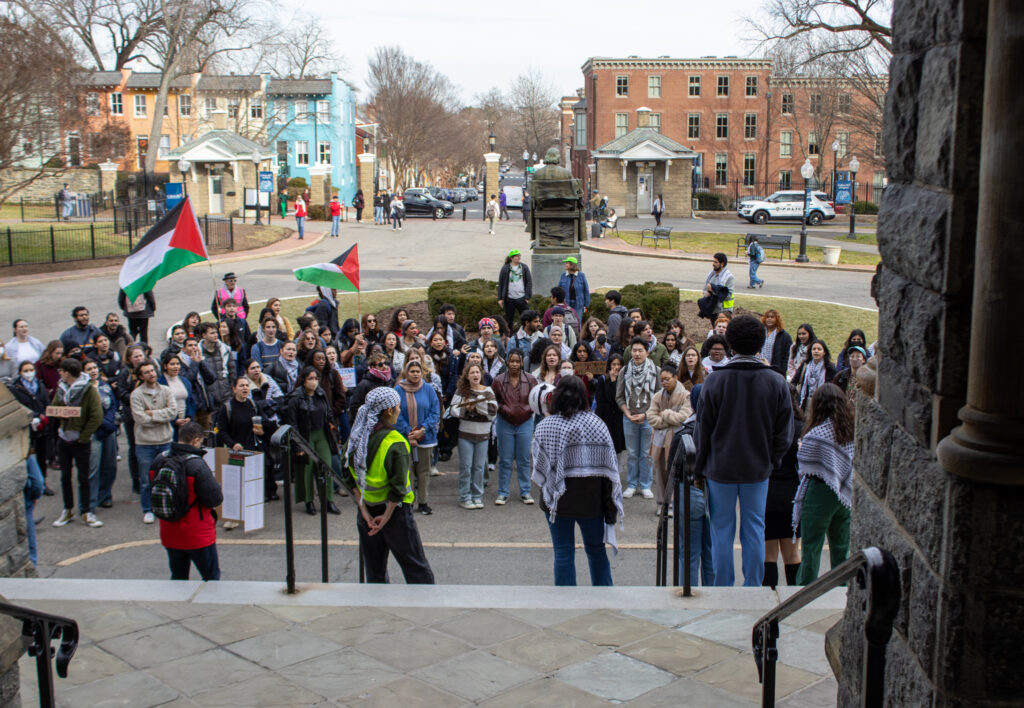 Photo by Connor Martin
Photo by Connor Martin
“Despite Georgetown’s claims to adhere to socially responsible investing policies, the university maintains investments in companies that perpetuate human rights violations,” an organizer with Zeytoun (G ’24) said. “We cannot remain silent as our university’s investment funds the machinery of oppression and destruction.”
Student protest for university divestment from companies complicit in human rights abuses and other social injustices is nothing new. In 1985, students occupied White Gravenor for two weeks and won partial university divestment from companies invested in South African apartheid. More recently, in 2020 students successfully pressured the university to divest from fossil fuels.
In 2017, Georgetown’s Committee on Investments and Social Responsibility rejected a student proposal to divest from companies with ties to Israel, stating that “divestment would not be an effective tactic to end hostilities or promote a peaceful resolution to the Israeli-Palestinian conflict.”
Before entering Healy, a representative from JVP spoke about her personal reasons for calling for divestment.
“As a Jewish student, I demand that Georgetown divest from all entities that facilitate genocide in Palestine,” Miriam Siegel (CAS ’26), an organizer in JVP, said. “The fight against oppression is deeply rooted in my Jewish identity and in Jewish history.”
After speeches concluded, organizers entered Healy Hall to deliver to the president’s office a community statement—including their demands—signed by over 1,000 students, faculty, and staff and 15 organizations.
When organizers delivered the petition, they were met by the head of security and director of the Center for Student Engagement, rather than an individual from the president’s office. The organizers returned to Healy lawn and addressed the crowd, expressing frustration that no administrators were able to receive their demands. The Voice confirmed that administrators have received the community statement and will review it.
“We have the letter. We just weren’t here because we were at a board meeting,” Dr. Joe Ferrara, vice president and chief of staff, said to the Voice later in the afternoon on Feb. 8. “We have the letter, and we’ll do what we always do and review it, sit down, talk about it, and figure it out.”
Although the university has yet to publicly respond to renewed calls for divestment, organizers remain determined to keep fighting.
“We must boycott, no matter the personal cost. We must divest, no matter the personal cost. We must speak up, no matter the personal cost,” Sinha said. “That cost will never compare to the 30,000 lives lost in Gaza.”
Editor’s note: This article was updated 4/19/25 at 3:15 p.m. to strike a name.

